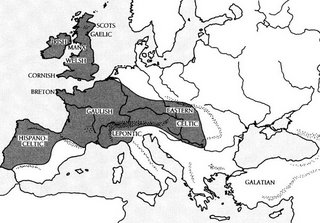
A strange happenstance in the story of European language that continues to fascinate me and 12 other odd souls in the world;
The division of the Celtic Languages into those who will use a "P" sound for the same word that another Celt will use the "Q" (or more modernly expressed hard "C" sound).
So, on the P team we have the Welsh, the Bretons, and in days gone past; the Cornish, Cumbrians, the Gauls (for the most part), the Lepontic Celts (Northern italy) and a few other stragglers. The Picts in Scotland are thought to have spoken a Pre-Celtic language that was later melded with. or superseded by, a P-Celtic dialect
On the Q Team we have the Irish, the Scots, the Manx, and in days gone by; the Celtiberians of Spain - now represented by the Galicians, Asturians, and to some extent, the Portuguese (presently, respectfully, speaking dialects of Spanish and Portuguese influenced by their former Celtic tongues).
as an example;
four and five in Welsh are "pedwar" and "pump"
in Irish they are "ceathair" and "cuig"
son in Welsh is "map"
in Irish it's "mac'
"head" or "headland" in Welsh is "Pen" - thus a large number of place names beginning wwith "Pen"
in Irish it's "Ceann" - ausually anglicized into "Ken" or "Kin" (thus Kenmore and Kintyre, etc.)
.....and so it goes. No one knows for sure how, why, and when the division began.
What is even more interesting is that a similar division occured within the Italic languages (Latin was a "Q" language and the long-gone Oscan-Umbrian languages "P").
The division was also evident between Latin and Greek. Thus prefixes for five derived from Greek use "penta-" (ie. pentagon, pentacle) while Latin uses "quinta-" (think of quintuplets and quincunx).
There is some postulation that the P-Celts on continental Europe lived in areas near the P-group Italics and Hellenics and there was some exchange of language pattern.
We know from Pre-Roman inscriptions that the Celtiberians of Spain spoke a Q-celtic language and this may give credence to the ancient Irish oral tradition that claims a major Celtic settlement via the sea from Northern Spain some 2500 or more years ago. A friend of ours from Galicia is fond in pointing out that her family could easily pass for Irish.
* now, for an almost unrelated diversion; I've heard it said that some scholars claim that "the eeney, meeny, miney, moe" of "catch a tiger by the toe" is derived from the Pre-Celtic language of Britain. Then there is the old language of the tinkers in Ireland and Scotland...

3 comments:
Very, very interesting blog entry. Cheers!
Thanks Persephone - but not as rainsoakingly verdant as your latest!
- tomas mac eamonn
Took me time to read all the comments, but I really enjoyed the article. It proved to be Very helpful to me and I am sure to all the commenters here! It's always nice when you can not only be informed, but also entertained!
- John
Post a Comment